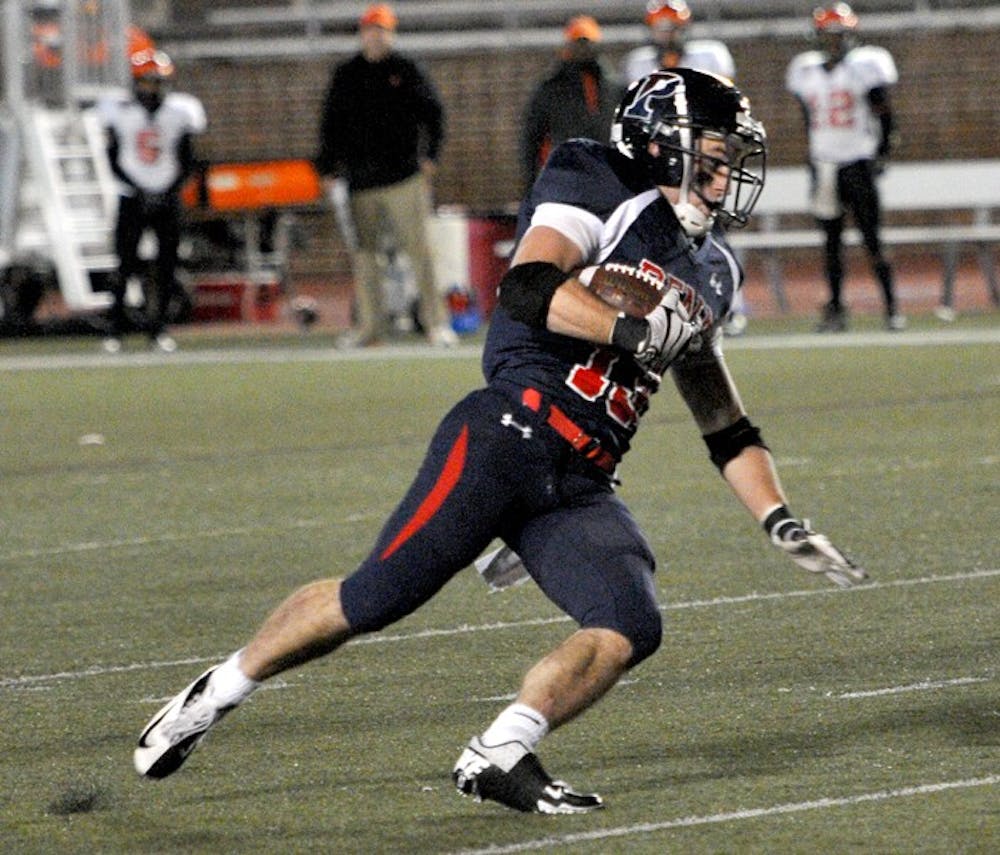Unless they miss a block, commit a penalty or accidentally injure another player, offensive linemen are rarely noticed by the average fan. But there are few positional groups more crucial.
And for three consecutive seasons, the Penn sprint football team has enjoyed a coach’s dream of having three returning starters on its offensive line. These three seniors — Chris Nagle, Matthew Paige and Jordan Colbert — have provided a bedrock for the running game and a great wall for the passing game.
So the natural question is, what makes the offensive line so important? The answer is simple.
Unity.
Penn’s “bro-line” (as the Quakers’ offensive linemen refer to themselves) doesn’t form the textbook picture of a line for football fans, who generally think of 300-pound monsters. Still, everyone on the “bro-line” works toward the same goal as their larger counterparts: opening running lanes and protecting the quarterback.
“We all had pretty unique experiences playing high school football,” Paige said. “Now we are playing our same position in sprint and it’s a totally different dynamic. And I think because of that, that’s part of our bond, going against 300-pound kids back in the day.”
“The bro-line is one of the more unique positions [in] sprint football, you know, because skill positions are relatively, similarly sized as if they were playing the big team,” Nagle added. “But we are a bunch of 170-pound linemen, so I guess that sets apart from other positions on the team.”
Three seasons together allows a group of men to learn about each other, spend time with each other and ultimately develop a chemistry that allows them to act as one cohesive positional unit.
“We have … the most to think about on every single play,” Colbert said. “We all know at least four calls every single play, and a lot of times we have to make calls up on the fly, like relevant to each other but no one else on the field knows.
SEE ALSO
Penn sprint football rolls over Cornell, 28-14
Lengyel | Lineup changes paying dividends for Sprint Football
“But all of us know exactly what the other is talking about.”
On the football side, the players have had time to make mistakes, learn from each other and master a system that has translated into consistently explosive offensive production in the season’s early going.
And the Quakers’ 2-1 start hasn’t affected Penn’s “bro-line,” which knows how to have fun and lets everybody on the field know too.
“We are definitely the group that has the most fun on the field,” Nagle said. “Even after a pass play some of us on the O-line will start chirping the defense, saying stuff like, ‘Oh yeah bro-line!’”
“We definitely have the most pride as a unit,” Paige said. “Funny thing, two years ago, we made ‘bro-line’ pinnies and gave each other nicknames, and so we wear those around.
“It’s just like our line calls, it’s the inside jokes of the bro-line. We are always laughing.”
As the saying goes, practice makes perfect, and those who gel will play well together. The “bro-line” knows that, and it aims to make sure its opponents know it too.
SEE ALSO
Penn sprint football rolls over Cornell, 28-14
Lengyel | Lineup changes paying dividends for Sprint Football



